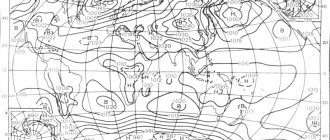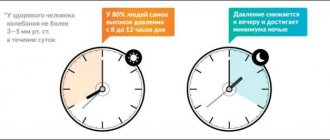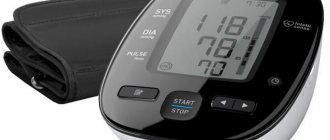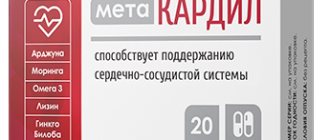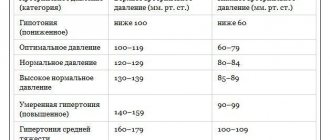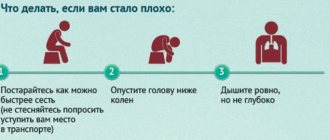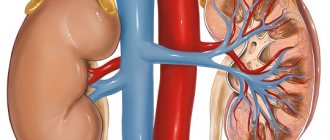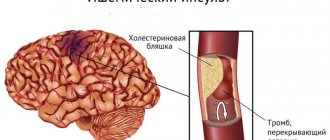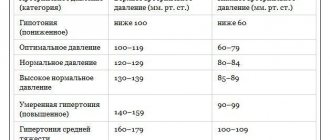VSD is a common set of symptoms that in our time has affected not only adults, but also children. There are many causes for this disease, and therefore each clinical case has its own individual characteristics and many approaches to treatment. A common symptom – surges in blood pressure – also cannot be called constant and unambiguous. Pressure during VSD can either increase or decrease, leaving the diagnosis legitimate. With this disease, it is important to understand that “blood pressure instability” is a symptom that disarms the patient in the face of many life-threatening situations.
Over many years of observing, diagnosing and treating patients, specialists at the Yusupov Hospital have proven their ability to help patients solve their problems, improve their quality of life, and move from “tolerate” to “overcome.” Doctors at the Yusupov Hospital will help determine possible causes and select medications that will help a specific patient and in a specific clinical situation.
High blood pressure - causes and symptoms
An increase in blood pressure is most often a reaction of the human body to an irritant (stress, hormonal changes, climate change, etc.). The body, in turn, compensatoryly increases the heart rate, causing the heart to work harder and with greater force. But the opposite situation also happens - when high blood pressure is accompanied by a low heart rate. The reason for this is impaired regulation of the cardiovascular system. With low heart rate and high blood pressure, the brain and heart are primarily affected. Disruption of the blood supply to these organs can threaten the patient's life, so he needs immediate examination and treatment.
Over time, pressure surges become more and more common. This affects a person’s well-being. Symptoms that may bother the patient:
- increased heart rate;
- dizziness;
- headaches of different localization;
- chills or fever;
- short-term visual impairment (“spots”).
These symptoms make a person forget about everything and concentrate only on how he feels, thereby aggravating the situation. When measured with a tonometer, the increase in blood pressure can reach extremely high numbers. At the same time, the headache intensifies, the heartbeat quickens, and the fear of death appears. Despite such poor health, these pressure surges do not carry with them serious consequences. In no more than two hours, the crisis will end with increased urination.
In this case, it is very important to differentiate high blood pressure from a hypertensive crisis, which is dangerous to the health and life of the patient and requires urgent therapeutic measures.
What symptoms should you pay close attention to (when to see a doctor)?
Dangerous manifestations are diverse, which signs should be especially wary:
- Intense headache for no apparent reason. Accompanied by a squeezing sensation in the back of the head and parietal region.
- Vertigo. Up to complete loss of orientation in space during acute ischemia of the cerebellum, which is responsible for the vestibular apparatus.
- Vomiting without signs of relief after the process.
- Aching pain behind the sternum, acceleration of the heart rate or, on the contrary, its slowdown.
- Problems with heart rate (lack of a clear pattern of the organ’s beating, randomness in its work).
- Sweating (hyperhidrosis).
- Cognitive impairment (decreased memory, mental activity).
- Facial distortion, inability to control facial muscles.
- “Disobedience” of half the body. Paresis, paralysis.
- Paresthesia, sensation of goosebumps running on the skin.
- Impaired hearing, vision, and smell (focal neurological symptoms).
The appearance of any of these manifestations is grounds for calling an ambulance. Especially if you suspect a stroke or heart attack.
Low blood pressure - causes and symptoms
Low blood pressure is also a complication of VSD, causing no less trouble for patients. The patient's body reacts to irritating factors by dilating peripheral vessels, and inhibition dominates in the central nervous system. Patients justify low blood pressure for themselves with all sorts of secondary reasons, without noticing other symptoms.
The most common symptoms of low blood pressure are:
- excessive weakness;
- pathological fatigue;
- increased drowsiness, light sleep itself, frequent nightmares;
- dizziness to the point of fainting;
- impairment of cognitive functions (memory, attention, concentration).
How dangerous is such a condition?
Depends on the tonometer readings and the intensity of the hypertensive process. The normal range is 100-140 by 80-90 mmHg, and the maximum permissible deviation is 10 units. 20 or more is a reason to contact a cardiologist.
A critical increase in blood pressure is accompanied by levels of 190-200 to 100-120 and higher. Such changes in the evening and at night do not bode well: a stroke, heart attack, interruptions in heart function, even cardiogenic shock are possible.
In the long term, there is a risk of congestive heart failure, coronary artery disease, and nephropathy.
Calling an ambulance will be the best solution to the problem under such conditions.
Measurements are taken every 20 minutes to monitor general condition. After the doctors arrive, you need to report your blood pressure levels.
Treatment of manifestations of VSD in Moscow
Due to the fact that VSD brings a lot of discomfort to the patient’s life, most begin to self-medicate. Pressure surges are so unstable and inconsistent that patients take several drugs from different groups that block each other’s action.
Treatment of VSD should begin only when the organic nature of the symptoms is excluded, because many diseases of the cardiovascular and endocrine systems, allergies, focal infections, etc. have a similar clinical picture.
VSD therapy is complex:
- lifestyle modification: proper nutrition, daily routine, stress management (possibly consulting a psychologist);
- attracting specialists from various fields (gastroenterologists, endocrinologists, cardiologists, neurologists, etc.);
- drug treatment aimed at relieving autonomic disorders of VSD (Concor, Paxil, Teraligen);
- physiotherapeutic methods of treatment.
Due to constant anxiety, fear of attacks, drowsiness and disturbed sleep, patients cannot cope with this on their own. The prescribed drug "Paxil" successfully copes with its task - sleep improves, patients get rid of panic attacks, and anxiety goes away. An important feature of Paxil is its ability not to affect blood pressure, which allows it to be used in patients with both hyper- and hypotension.
For mild disorders, if treatment was started in a timely manner, Teraligen performed excellently. It has a mild sedative effect and begins to act almost immediately after administration. It is also important that the drug potentiates the effect of other drugs, so it has to be taken in small dosages, and patients really like this.
For patients with the hypertensive type of VSD, our specialists successfully prescribed the drug Concor, which blocks signals that stimulate the heart, to patients at the Yusupov Hospital.
Concor for VSD reduces the heart rate, normalizes heart rhythm, helping to reduce the heart's need for oxygen. Concor for VSD helps to reduce activity in the sympathetic department of the autonomic nervous system and acts directly on the heart muscle. Concor is a drug that has proven itself to normalize heart contractions in the presence of VSD. The dose of the drug is selected and adjusted only by the doctor.
Patients of the Yusupov Hospital note a quick and long-lasting effect, and if the dosage prescribed by our specialists was followed, no side effects were observed.
“Anaprilin” has also proven itself well for the treatment of VSD. Although this drug is non-selective and acts not only on cardiac receptors, it is the drug of choice when an immediate effect is needed. By reducing the strength and frequency of heart contractions and blocking the action of hormones, it reduces the heart's need for oxygen. Under the influence of anaprilin, blood pressure decreases during VSD. Patients note the advantage of Anaprilin for VSD in that it works quickly, and this is a priority.
Paying attention to the mechanism of increased pressure during VSD, it would be logical to talk about “Enap” in this article. The drug prevents the narrowing of the arteries, preventing the development of hypertension and preventing an increase in pressure during stress or the action of a reflex mechanism. This drug has shown a good effect in patients with frequent panic attacks, since under the influence of the drug the receptors become immune to adrenaline, which makes it possible to break the vicious circle and cope with the symptoms of VSD.
First aid for an attack of hypertension
A significant increase in blood pressure levels requires urgent medical attention. You should call an ambulance. Before the doctors arrive, you will need to take a horizontal position, calm down and not panic. This will only worsen an already serious condition.
Showers, baths and other dubious methods should be left aside. This is harmful advice that can cost the patient’s life.
Before the ambulance arrives, you should take the prescribed drug (if treatment has already been prescribed) or a medicine based on herbal components, phenobarbital (Corvalol, Valocordin, Motherwort and Valerian, but not in the form of an alcohol tincture: ethanol is the enemy of hypertension).
Capoten, Captopril, vasopressors (dopamine) and other medications should not be taken: it is impossible to calculate the dose yourself, so there is a risk of a sharp drop in blood pressure with the development of a heart attack or stroke.
Upon arrival of the team, the issue of possible transportation to a hospital is decided. Whether to go or not is up to the patient himself. But there is no point in refusing: it is not known what we are talking about. It is better to understand and establish the root cause.
Treatment of manifestations of VSD in Moscow
Medicine has always developed dynamically, and at the moment there is a whole host of effective treatment methods. The specialists of the Yusupov Hospital, using their accumulated knowledge and skills, never cease to absorb new knowledge. There is no panacea for all diseases, but this is not a reason to be alone with your problems. The clinic’s doctors find an individual approach, select the treatment necessary in a particular case, provide comfortable conditions, and help where your body could not cope. Don’t put up with the symptoms - make an appointment by calling the Yusupov Hospital.
What examinations will be required?
Cardiologists manage patients with arterial hypertension, especially in the evening. At the discretion of the specialist, a nephrologist, neurologist, and endocrinologist are involved.
List of possible studies:
- Examination of the patient, assessment of complaints. Objectification of symptoms for further analysis and comparison of factors.
- Collecting anamnesis (personal and family). Possible heredity, the presence of bad habits.
- Measuring blood pressure using a tonometer. On two hands.
- Study of daily blood pressure dynamics. A Holter monitor is used, which is installed for 24 hours and first programmed. Measurements are taken every 20-40 minutes and the results are recorded in the device’s memory.
- Echocardiography. Ultrasound technique. Hypertension produces characteristic changes in the heart (myocardial thickening, left ventricular hypertrophy).
- General blood test, biochemical test, urine test.
- Assessment of hormonal levels, neurological, nephrological status using special techniques.
A comprehensive examination is the key to a quick diagnosis.
Therapeutic measures
Specific therapy, using drugs of several groups:
- Beta blockers.
- Calcium channel blockers.
- Diuretics.
- ACE inhibitors.
- Vitamin and mineral complexes.
- Food supplements with microelements.
Statins are used to eliminate lipid deposits.
Tonics are not used as they are dangerous and ineffective in the fight against high blood pressure.
Herbal sedatives based on motherwort and valerian, and barbiturates in small dosages are prescribed.
If necessary, surgery is indicated (heart defects, vascular defects, development of malformations, benign and malignant tumors in anatomical structures, aneurysms, cholesterol plaques).
Given the physiological nature of the condition, a change in schedule and lifestyle is indicated. You need to sleep at least 8 hours, avoid exercise, smoking, alcohol, especially psychoactive substances, use drugs in a strictly designated dosage after consultation with a specialized specialist.
Systematicity and complexity are important in treatment.
